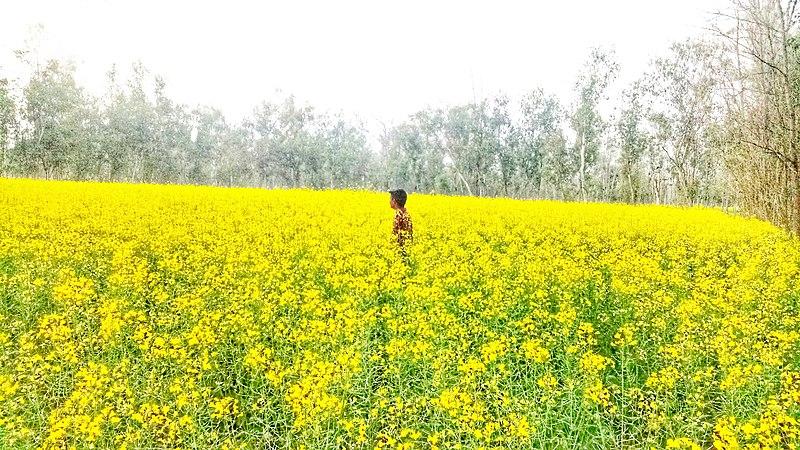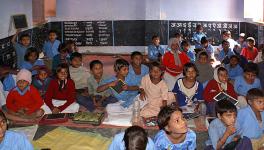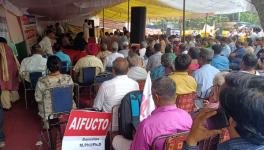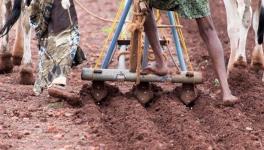Open Field Tests of GM Mustard Need to be Conducted with Utmost Precaution: AIPSN

A boy standing in mustard field here in india. Image Courtesy: Wikimedia Commons
Following the go-ahead for production and field testing of hybrid seeds of genetically modified (GM) mustard, All-India Peoples Science Network (AIPSN) has demanded that the open field tests, if any, be conducted with “utmost precautions and in carefully selected locations to ensure strict isolation from neighbouring fields of mustard”.
The statement from the AIPSN comes after the Genetic Engineering Appraisal Committee (GEAC) permitted on October 18 field testing of the DMH II variety of GM mustard. It has called the approval “the most significant step in India regarding GM foods” since the moratorium announced on the release of Bt Brinjal in 2010.
AIPSN noted that concerns have been expressed about the herbicide tolerance built into the GM hybrid. “Whereas the GEAC release clarifies that the particular “bar” gene is a marker for herbicide tolerance only during “hybrid seed production... not for cultivation in the farmer’s field under any situation” it would have been better if seed production trials take place in a controlled rather than in an open environment so as to assess various risks before conducting open field trials.”
The Network also suggested that the trials be conducted by public bodies such as Indian Council of Agricultural Research or agricultural universities under the supervision of an independent committee of experts from different relevant disciplines – including ecologists, eco-toxicologists, pollination biologists, farmers’ organisations and concerned civil society organisations. “The trials should be conducted with full transparency, and the data generated should periodically be placed in the public domain. […] Finally, AIPSN urges that any eventual decision on commercial release must be taken after thorough rigorous assessments of the results of these trials and based on a detailed plan for regulatory systems and institutional framework governing modalities of seed production and distribution, including provisions for public scrutiny of the same,” read the statement.
Read the full text of the statement below:
The Genetic Engineering Appraisal Committee (GEAC) on 18th October 2022 permitted production and field testing of hybrid seeds of genetically modified (GM) Mustard named DMH II. Commercial release of the seeds has still not been allowed pending open field trials. The approval would be for 4 years extendable depending on compliance with various conditions. The current approval is the most significant step in India regarding GM food since a moratorium was announced on the release of Bt Brinjal in 2010.
AIPSN notes that many scientists and farmers’ organizations have expressed serious concerns on different grounds regarding the GEAC decision. Noting that the GEAC release also specifies that the field trials would study the impact on pollinators and other insects, AIPSN strongly suggests that such studies be conducted over a longer period and on a range of other ecological parameters as well.
Concerns have also been expressed about the herbicide-tolerance built-in to the GM hybrid. Whereas the GEAC release clarifies that the particular “bar” gene is a marker for herbicide tolerance only during “hybrid seed production... not for cultivation in the farmer’s field under any situation” it would have been better if seed production trials take place in a controlled rather than in an open environment so as to assess various risks before conducting open field trials.
AIPSN urges that open field tests if any be conducted with utmost precautions and in carefully selected locations to ensure strict isolation from neighbouring fields of mustard. The trials should be conducted by public bodies such as ICAR or agricultural universities etc under the supervision of an independent committee of experts from different relevant disciplines including ecologists, eco-toxicologists, pollination biologists, farmers’ organisations and concerned civil society organisations. The trials should be conducted with full transparency, and the data generated should periodically be placed in the public domain.
AIPSN welcomes exploration of different kinds of science-based solutions to the problems of agriculture including the present need to find solutions for the low productivity of edible oilseeds and increasing dependence on imports in India. AIPSN urges the government to also explore a wide variety of diverse technological options including bio-technological solutions that are ecologically, socially and economically viable within the framework of innovation through the public sector research system. Further, in order to make an immediate dent on production and imports the government should encourage farmers to increase mustard production by announcing a higher MSP and include mustard oil in the items to be sold through public distribution system.
AIPSN notes that, in contrast to earlier releases by agri-business corporations, DMH-II has been developed by a public sector laboratory in Delhi University in collaboration with the National Dairy
Development Board (NDDB). Nevertheless, DMH-II is a hybrid seed which has to be purchased by the farmer every season, not a variety which can be bred by farmers themselves. So there is concern whether the technology of seed production, or the production and distribution itself, would remain with PSUs or be handed over to private entities, with possibly adverse effects on prices, availability and access by farmers. AIPSN urges the government to strengthen the contribution of the public sector in the production of mustard seeds also.
Finally, AIPSN urges that any eventual decision on commercial release must be taken after thorough rigorous assessments of the results of these trials and based on a detailed plan for regulatory systems and institutional framework governing modalities of seed production and distribution, including provisions for public scrutiny of the same.
Get the latest reports & analysis with people's perspective on Protests, movements & deep analytical videos, discussions of the current affairs in your Telegram app. Subscribe to NewsClick's Telegram channel & get Real-Time updates on stories, as they get published on our website.
























